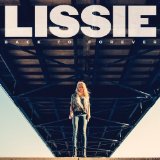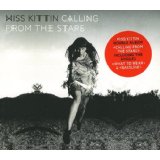 This is singer-song writer, Lissie’s second album after her acclaimed 2010 debut, “Catching a Tiger”. That album branded Lissie a ‘folk’ artist, but her follow-up, shows she’s made of much more musical variety. ITunes brands it ‘folk/country’ but it’s probably more ‘rock/pop’. Much of the production duties fall to the producer of REM and Snow Patrol and you can tell this, in fact it’s the production where I find fault, the album sounds rather muddy and crowded throughout, especially in the bass tones, lacking the light touch of her first effort. The sound is more drivetime-friendly and stadium-ready; I don’t want to be like a Dylan fan erupting in rage at his first electric album, but if you like this type of Americana, there is plenty to sing along to. Arguably, it might be hard to produce a unique sonic experience anymore with the standard guitars, bass, drums and keyboard, even with the range of tempos, themes and moods we have here.
This is singer-song writer, Lissie’s second album after her acclaimed 2010 debut, “Catching a Tiger”. That album branded Lissie a ‘folk’ artist, but her follow-up, shows she’s made of much more musical variety. ITunes brands it ‘folk/country’ but it’s probably more ‘rock/pop’. Much of the production duties fall to the producer of REM and Snow Patrol and you can tell this, in fact it’s the production where I find fault, the album sounds rather muddy and crowded throughout, especially in the bass tones, lacking the light touch of her first effort. The sound is more drivetime-friendly and stadium-ready; I don’t want to be like a Dylan fan erupting in rage at his first electric album, but if you like this type of Americana, there is plenty to sing along to. Arguably, it might be hard to produce a unique sonic experience anymore with the standard guitars, bass, drums and keyboard, even with the range of tempos, themes and moods we have here.
Despite the carpet-bombing of her marketing team, Lissie has been rather over-looked, although “When I’m Alone” made it to iTunes best song of 2010. Perhaps this is partly due to her not being either air-brushed or especially grungy, but she is starting to sell out stadiums across Europe and is currently performing dates in the UK. This fuller sounding set of 12 songs (some extras with the deluxe version), are all originals written by California-based Lissie and the band. The lyrics and music are all good, launching with the uptempo “The Habit”, ‘You’ll never get out/And you’re always gonna be an addict/ The heart breaks way before the habit’ and it’s these touches lyrically that make the album, along with her vocal timbre.
I don’t have a favourite amongst these tunes but there’s no real filler either. The singles are here, “Further Away (Romance Police)” and “Sleepwalking” and they’re bouncy enough to get Radio 2 airtime, but also check out the slower “They All Want You” for a greater exhibition of Lissie’s voice. This is not a concept album but a collection of songs about relationships and issues, including low pay, the anthemic “I Don’t Wanna go to Work” and the glamour industry, “Shameless”. (‘I don’t want to be famous, if I got to be shameless’).
I was going to award this album 4*, but that’s the figure I gave the first album and I do believe that’s better, or perhaps I prefer her earlier, more acoustic sound, so maybe just 3.5 stars for Back To Forever. Out now.
 Electroclash’s First Lady, French DJ and singer songwriter Miss Kittin’s third solo album is a 2 CD affair but is also her most straightforward collection of songs to date. Her schizophrenic debut “I Com” and its more underground follow-up ‘”Batbox” were both idiosyncratic, humorous, hard and dark albums but neither quite matched up to the brilliance she had already achieved with The Hacker (“Frank Sinatra”), Felix Da Housecat (“Silver Screen Shower Scene”) and Golden Boy (“Rippin Kitten”); between 2001 – 2003 Carline Herve was the go- to ‘featured artist’ and in demand collaborator and was one of the main characters and artists that defined that short-lived, exciting era and one of the few that is also still recording today.
Electroclash’s First Lady, French DJ and singer songwriter Miss Kittin’s third solo album is a 2 CD affair but is also her most straightforward collection of songs to date. Her schizophrenic debut “I Com” and its more underground follow-up ‘”Batbox” were both idiosyncratic, humorous, hard and dark albums but neither quite matched up to the brilliance she had already achieved with The Hacker (“Frank Sinatra”), Felix Da Housecat (“Silver Screen Shower Scene”) and Golden Boy (“Rippin Kitten”); between 2001 – 2003 Carline Herve was the go- to ‘featured artist’ and in demand collaborator and was one of the main characters and artists that defined that short-lived, exciting era and one of the few that is also still recording today.
“Calling From The Stars” is consistent, high quality electronica; there is no radical departure here so don’t expect any surprises. The second disc is really a stand-alone piece (“Part 2”) that is largely instrumental and ambient and not essential but the main album has some nice highlights, and for the first time is completely self-produced. Elements of classic, early house music blended with supremely melancholic synth lines appear early on with the rolling, chunky “Come Into My House”, appropriately enough, and also on the equally solid “Bassline”. “Maneko Neko” is staccato, deadpan electro pop, very reminiscent of her earlier work, as is “Blue Grass” which actually sees the Kittin harmonising with herself towards the end. She also sings REM’s “Everybody Hurts” as a pretty, faithful to the original ballad, albeit completely electronic, which is interesting to hear maybe twice but serves as little more than a novelty cover. “Tears like Kisses” is another slower track but one which comes with explosions, a beat box, laser guns, and Kittin, none too convincingly, singing ’ I’m crying because I’m happy’ and sounding fantastically lush and full against the jagged, chilly sound effects. There are actually too many slow tracks here, oddly, and unlike the majority of her discography, although she does reference discotheques here, she never once breaks into a sweat. In fact this is so polished, so elegant that I wonder where the earlier personality has gone; lyrically some eccentricity remains but sonically, this has been pretty much eliminated here.
I have read that this is Miss Kittin’s attempt at something more mainstream and pop, uncluttered and pure. To a point this has been accomplished and tracks like “Bassline” and “Tears Like Kisses” will definitely find fans, although I’m not sure how many new ones. A lightness of touch is missing that could have transformed some of these tracks into something that could have been a more deadpan, a grown-up version of somebody like Robyn, or Kylie even . It’s nice to have her back but to really re-establish herself as a vital, relevant presence in a pretty crowded electronic scene which has moved on considerably from a decade ago, one way or another this Kittin really does need to let rip again.


